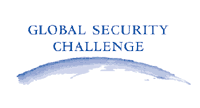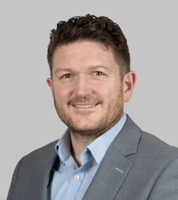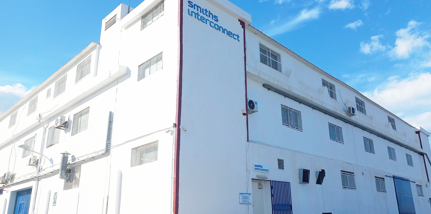28 October 2007
Global Security Challenge competition has chosen the five most promising security startups in the world
THE organizers of a competition to find some of the world’s most promising security technologies today announced five finalists. 
The Global Security Challenge (GSC) is organised by MBA students at London Business School and supported by Smiths Detection, the US Department of Homeland Security, ONR Global, BAE Systems, Accenture and SAIC among others.
The five businesses are competing to win a $500,000 grant, which is sponsored by the US Government’s Technical Support Working Group (TSWG), and mentorship from leading venture capitalists, including Paladin Capital Group. The winner will be announced in London on November 8.
The five finalists have developed technologies that can identify people through biometric analysis of how they type, scan the eye to assess a person’s health, protect against multiple explosions, detect and identify people at night without illumination and recognise faces despite changing light, facial expressions and the presence or absence of beards, moustaches or spectacles.
The finalists are:
- Psylock (Germany) – identifies users through biometric analysis of typing behavior
- Auxetix (UK) – fortifies protection against multiple explosions through helical-auxetic nets
- NoblePeak Vision (USA) – enabling the rapid detection and identification of people and objects at night without active illumination
- EyeMarker (USA) – scans the eye to rapidly and non-invasively assess a person’s health
- XID Technology (Singapore) - face synthesis technology for real-time 3D rediction/replacement in a 2D video
This is the second Global Security Challenge. Last year’s winner was the London-based Ingenia Technology, which has developed technology that mimics the biometric principle in humans but applies it to inanimate objects such as documents, goods and packaging allowing them to be authenticated and verified.
The organizers are pleased by the substantial number and high quality of entrants from around the world this year. Simon Schneider, co-director of the GSC, said: “We are especially happy about the increase of European submissions in this year’s Challenge. Over 40 per cent of the entrants came from European universities, research labs and entrepreneurs’ garages. This is a strong indication of the intellectual strength and creativity that European innovators can bring to the area of high-tech security solutions.”
Stephen Phipson, Group Managing Director of Smiths Detection, said: “Technology has driven the growth of Smiths Detection. Contributions from academia and start-up businesses give us a competitive edge and help us to develop a world-leading business serving the homeland security sector. We are delighted to be associated with this exciting global initiative.”
ENDS
Psylock – Germany
Psylock provides a unique biometric technology that authenticates computer users securely on any computer, without requiring hardware or installation and with very precise recognition rates. Each user is authenticated by the specific way he or she types at a common computer keyboard. The analysis not only validates dependant parameters, like the speed and rhythm of typing which can vary depending on the circumstances, but also stable parameters of typing like left- or right-handedness, typical typing mistakes, correction methods and more. The result is calculated based on complex statistical models and artificial intelligence.
Auxetix Ltd – United Kingdom
The Auxetix blast-mitigation fabrics use a completely new kind of technology that provides enhanced multiple-event protection for windows by exploiting the unusual behavior of the helical-auxetic system. The fabrics, which are composed of large numbers of thin high-strength fibers wrapped around elastomeric cores, can also be used to line military vehicles and aircraft, enhance body armors, in transportation crates, and for the protection of stored ordnance. The technology responds to a blast by expanding which allows a blast front to pass through the material slowing it down and reducing its capacity to kill or injure.
XID Technology - Singapore
All face recognition systems are sensitive to changes of lighting conditions (outdoor), face poses (3D rotation), facial expressions, presence/absence of beards, glasses, moustaches… The reason is simple: the face in the database is very different from the live face captured from the camera. Indeed, a same person appears in thousands different ways, by changing the lights, pose, expressions etc… XID, with its patented and award-winning Face Synthesis technology enhances the database (or on-the-fly) by generating in real-time thousands of new facial appearances from a single 2D photo. The database is richer (many images/person) and the Equal Error Rate of any face recognition engine drops dramatically. Results are proven on the field, outdoor, 24/7, with thousands of blue collar workers, one of the most difficult biometric users. XID offers 4 operational benefits:
- Robust recognition: ‘face synthesis’ represents an individual with thousands of facial images and has proven to offer a much more robust face recognition. Works outdoor with dirty workers!
- Maintenance: Face synthesis is to face recognition what an Anti-virus is to Windows. When a face recognition system does not work, just use more Simulation models – add more lighting, poses, expressions and artefacts (glasses, moustache, medical masks,…). Current maintenance either requires re-enrolment of images or change of matching engine. Synthesis enhances the database automatically.
- Real-time: A standard Pentium 4 generates 1000 images per seconds. XID plans to offer Face synthesis on chip, reaching a 1,000,000 synthesis per second;
- Economical: Face recognition to work needs thousands images/ person. synthesis helps the enrolment officer, saves time and money; XID plans to create a 3D face reconstruction chip from a single 2D photo that can be used everywhere, from biometric passports, access control, image search, to media applications like 3D avatars constructions and face replacement into video and video games, where XID is also a an award-winner and worldwide innovator.
NoblePeak Vision - USA
NoblePeak Vision provides camera core and imager products that are sensitive over the visible to short-wave infrared (SWIR) spectrum and that provide breakthrough night vision performance with applications in the security, transportation and defense markets. NoblePeak’s unique integrated approach allows the entire infrared image sensor to be manufactured in a standard silicon process line, yielding never before achieved reliability and economics. Founded in 2002, NoblePeak Vision is a private company funded by Matrix Partners and North Bridge Venture Partners. The company is headquartered in Wakefield, Massachusetts.
EyeMarker Systems - USA
EyeMarker Systems is an emerging company committed to the commercialization of innovative ocular screening technology. The expertise found within EyeMarker, combined with that of its partners and collaborative research institutions, provides a solid foundation for the development of an Ocular Scanning Device to benefit the Defense, Emergency response, Homeland Security and Clinical medicine markets. EyeMarker Systems was founded in 2001 and established headquarters and research capabilities in Morgantown, West Virginia, in close proximity of West Virginia University and the WVU Robert C. Byrd Health Sciences Center.
http://www.eyemarkersystems.com
Global Security Challenge
The Global Security Challenge (GSC) is an annual competition to find the most promising security start-up in the world. The founders have gained experience in the security technology sector with IBM, Sagem Défense Sécurité and the National Security Council at the White House. The mission of the GSC is to stimulate technological innovations that make airports, cities and enterprises safer without encroaching on civil liberties. The GSC was founded by London Business School students and is supported by Accenture, BAE Systems, Bosch, TSWG, Smiths Detection, ONR Global, US Department of Homeland Security, PegausBridge Fund, BWI and SAIC. The exclusive partner universities of the GSC are Mississippi State University, National University of Singapore, Technical University of Munich and London Business School. For more information visit: www.globalsecuritychallenge.com
General media enquiries
Contact our global media and communications team at:

Please note – the press team can only answer enquiries from accredited members of the press.
Related articles

Smiths Detection secures deal to supply systems to major cruise lines
Find out more

Smiths Interconnect expands EMEA cable harness production capacity
Smiths Interconnect, announces the expansion of its cable harness production capacity at its facility in Tunisia, an investment for growth in support of all its EMEA production sites.
Find out more

Smiths Detection accelerates AI security offering with BigBear.ai collaboration
Read our company news as Smiths Detection accelerates its AI security offering with BigBear.ai
Find out more

